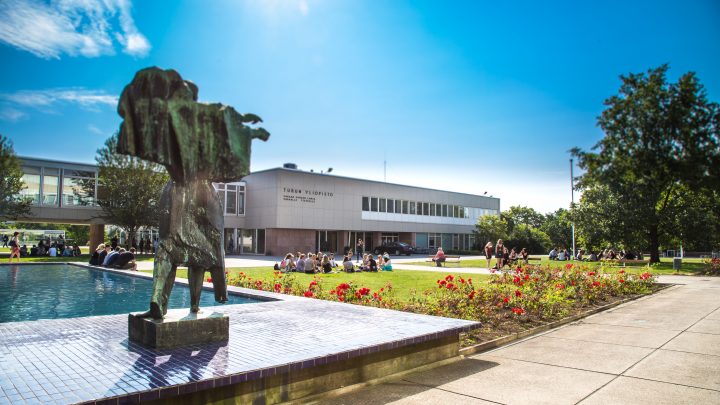Towards summer and a new normal
We as a community – together but regrettably often alone – have stretched, persevered, and coped in the coronavirus upheaval that has lasted for over a year. Everything started suddenly in March 2020, right after our 100th anniversary celebrations. At the time, we did not know how long and how severely the pandemic would affect us at the University, and more extensively in Finland and the world over.
Only now, we can see some real relief with the aid of the vaccinations and people observing the health and safety guidelines. In our neighbouring countries Estonia and Sweden, the situation has been and still is quite different. Finland has pulled through rather well.
Our traffic light model for the coronavirus situation is currently blinking a cheerful green. Therefore, we can start our summer holidays in good spirits. We all definitely need a break after this year of exceptional circumstances. Once again there is light and warmth, not only outside but also in our minds as we can rest, relax, and enjoy free time. And cheer our teams in the European football championship where Finland is historically playing for the first time.
The coronavirus had a great impact on us, even though as a university we did not experience similar crisis situations as some businesses and the culture sector, for instance. Our main missions in research and education continued, but changes to the work and study methods were vast. However, we transferred to remote work and distance learning surprisingly well and quickly. We possessed versatile competence and showed strong will and commitment when it was necessary.
A corresponding digital leap, which we knew to be necessary and inevitable at some point, would probably have taken us many years under the so-called normal circumstances. Now, we did it in a week when we were compelled to do so – sometimes necessity is the best consultant. But necessity and exceptional circumstances require enormous effort and take a toll on people. Still, we have demonstrated commendable resilience, staff and students alike. My sincerest thanks to you all!
What is the new normal in our community?
We have also faced difficulties and troubles. Most worrying has been the decrease in students’ well-being and coping during distance learning and with scarce social contacts. The students who started their studies last autumn are rather disconnected from our University, other students, and the greatly anticipated student life.
The new academic year with contact teaching can repair matters if we can use its opportunities skilfully and effectively. Our main focus will be the first- and second-year students, but we will do our best with all our students. We hope that the pandemic will give us the chance to do so.
When we return to work in the autumn, we will not return to the same operating model. We will return to the new normal, a hybrid model for working, which includes many aspects and methods from the old situation as well as new practices we have learned and developed during the exceptional circumstances. The members of our personnel have experienced this period differently: some have justified longing and desire to return to the office, but many also want to continue working remotely. Both working methods can and will be done, as long as the community enables it and the sense of community does not suffer. Furthermore, to many, remote work can represent social responsibility that follows the principles of sustainable development.
It is clear that the new normal will be more individual and flexible. It has to be so that working is smooth and personnel’s well-being and coping improves. At the same time, we have to make sure that the hybrid model maintains communality and a culture of working together. As we allow for more variety, diversity, and flexibility in our work community in a suitable measure, we will at the same time offer University-level guidelines for working and supporting leadership and management.
A more individual new normal is not an easy or simple operating model. However, we can achieve it, just as we have well managed the surprising and prolonged coronavirus circumstances. The significance of leadership is highlighted on every level, especially in the work of the heads of unit and supervisors. Fostering non-discrimination and equality as well as feelings of fairness and ensuring their realisation are vitally important also in the future.
Leadership and managerial duties are demanding in the exceptional circumstances, we all know this. A book on leadership I read a short time ago presents the VUCA framework, an acronym for volatility, uncertainty, complexity, and ambiguity, and it reflects the unpredictability of general conditions and situations.
We have lived, worked and studied within a VUCA framework for over year. We have succeeded well in these circumstances at the University of Turku. I wish to thank and congratulate all of you, students and staff, for a job well done.
In addition to a verbal thank you and similar to the gift at the turn of the year, the University offers its staff members a voucher for culture and sports to be used this coming autumn as a material thanks for the spring semester and a spur to the next academic year.
Have a wonderful summer and a relaxing holiday!

Jukka Kola
Rector of the University of Turku
